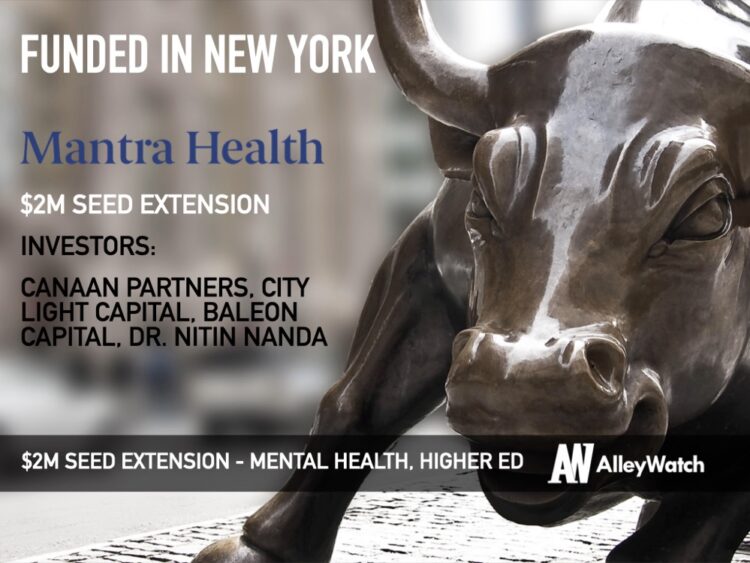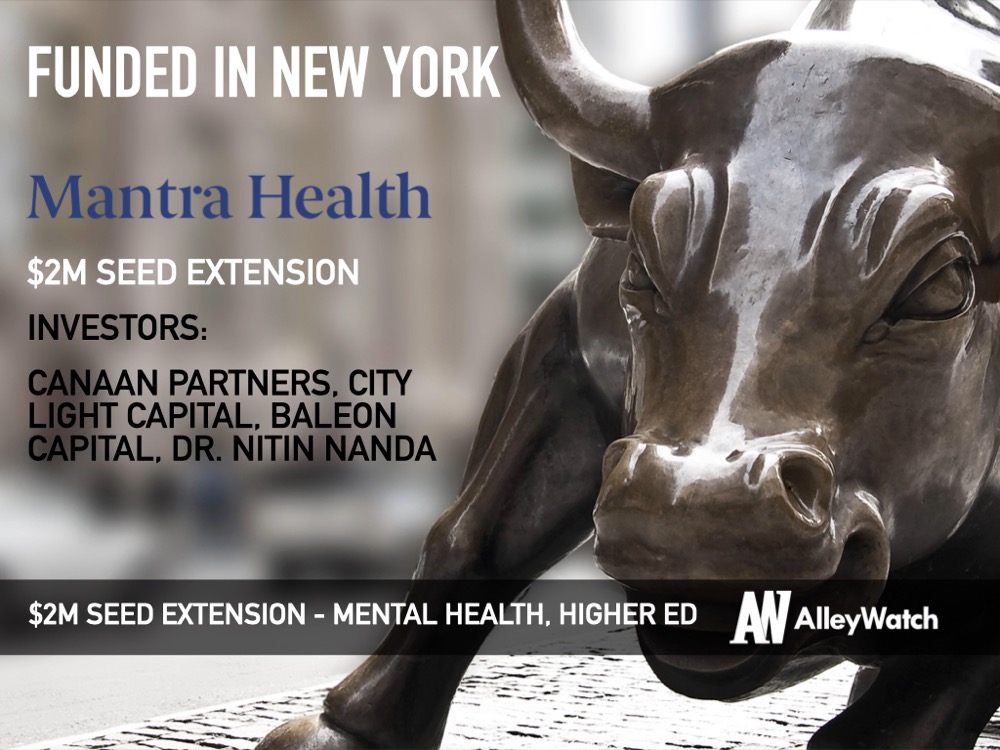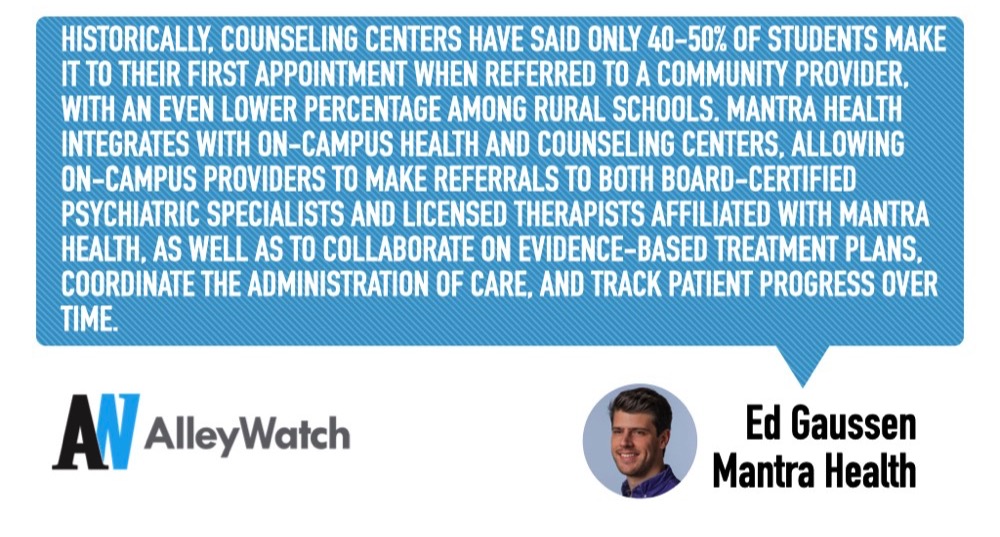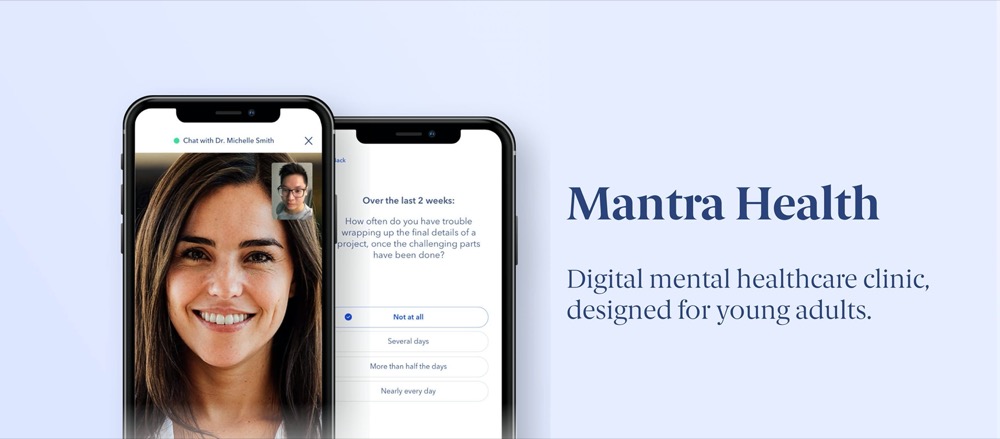According to the NIH, 71% of college students reported that stress and anxiety had increased due to COVID. Some of the most common stressors identified were concern over personal and familial health, difficulty concentrating, disruptive sleeping patterns, and decreased social interactions. However, only 5% of these respondents reported using mental health counseling services. Mantra Health is a digital mental health platform that partners with universities and colleges to make mental healthcare accessible to these students. The company offers at its core, a telehealth platform that provides students with access to licensed psychiatrists and therapy providers in the Mantra network and a back-end platform that allows the university to refer and monitor their students’ cases, supported by a robust EHR system. Students can now access vetted providers in minutes rather than weeks without worrying about cost; payment is a blend of insurance and university-sponsored. Mantra is live at campuses across six states presently with plans to provide nationwide coverage before the fall semester.
AlleyWatch caught up with Cofounder & CEO Ed Gaussen to learn more about the importance of making mental health accessible for college students, the company’s future expansion plans, and recent seed extension.
Who were your investors and how much did you raise?
Canaan Partners, City Light Capital, and Baleon Capital were amongst the investors. Additionally, we had some strategic angels, including Dr. Nitin Nanda, the founder of Aligned Telehealth, acquired by Amwell. We just closed an extension of $2 million bringing our total seed funding to $5.2 million.
 Tell us about the product or service that Mantra Health offers.
Tell us about the product or service that Mantra Health offers.
Mantra Health is a digital mental healthcare clinic that partners with colleges and universities that offer students both psychiatric and talk-based therapy. Mantra enables colleges and universities to offer collaborative, closed-loop mental health services with continuity of care for students. We use telehealth technology to deliver evidence-based mental health treatment by integrating directly with on-campus counseling and health centers, with the mission of improving the mental health of young adults regardless of their physical location or ability to pay.
What inspired the start of Mantra Health?
During my time in venture capital, one of my siblings had to drop out of college because of mental health challenges. During his time in college, my cofounder had a life-changing experience seeing a counselor on campus. Our stories are amongst millions: most college students today aren’t receiving the care that they need, at a time that is so crucial and formative in their lives. Mantra was built out of the realization that a mental health epidemic exists amongst our generation’s young adults – one that is used to consuming services through elegant experiences that leverage technology.
How is Mantra Health different?
Historically, counseling centers have said only 40-50% of students make it to their first appointment when referred to a community provider, with an even lower percentage among rural schools. Mantra Health integrates with on-campus health and counseling centers, allowing on-campus providers to make referrals to both board-certified psychiatric specialists and licensed therapists affiliated with Mantra Health, as well as to collaborate on evidence-based treatment plans, coordinate the administration of care, and track patient progress over time. Through a mix of software and care navigation, Mantra has seen that referral success rate spike to 97% when referring students to a Mantra-affiliated provider.
What market does Mantra Health target and how big is it?
Our target market is colleges and universities in the US who combined currently have 20 million students enrolled. We’re currently in 26 campuses across 6 states and will be expanding to all 50 states and Washington, D.C. by the fall 2021 semester.
What’s your business model?
Mantra’s patient payment mix is currently 80% university-sponsored and 20% through insurance. At the beginning of 2021, we started to accept UnitedHealthcare, Aetna, and Cigna. Our latest capital infusion will help us bring in additional insurance carriers later this year.
How has COVID-19 impacted your business?
Mental health issues including anxiety and depression were already at a crisis level across college campuses pre-pandemic, and the rate has skyrocketed once the pandemic started. As of April, we have a patient volume of about 100 times more than this time last year. COVID-19 has also put a spotlight on the nation’s racial and social inequities which also affect young people’s mental health. Our off-campus referral program helps on-campus counselors match students to a pool of providers with more diverse backgrounds and specializations to ensure that students have access to a culturally competent clinician.
What was the funding process like?
Fundraising levels have certainly picked up towards the end of last year, and there is no shortage of interest in digital health from VCs and angels. This round was raised opportunistically as we look to raise a larger Series A in the near future. As ex-venture capitalists, both Matt and I had a chance to build a network and the know-how to manage a tight process. We ended up combining existing investors who were excited to increase ownership, as well as new strategic investors who we think, will add enormous value for Mantra. From initial conversations to closing, the full process took about three months.
What are the biggest challenges that you faced while raising capital?
The biggest one is always to balance operations with fundraising. It is easy to get sidetracked in taking new investor calls, especially when many have an attractive profile. But it is crucial to give yourself a clear timeline, stick to it, and cap the number of calls you’re willing to take.
What factors about your business led your investors to write the check?
We think the tailwinds behind Mantra’s core business are extremely attractive. The pandemic has exacerbated the state of mental health amongst young adults, and with campuses shutting down, there has been a massive, overnight shift towards telehealth in Higher Ed. By a verticalized approach that is clinically informed, combined with the experience of our team and the quality of our backers, we think we’re perfectly positioned to dominate this market.
We think the tailwinds behind Mantra’s core business are extremely attractive. The pandemic has exacerbated the state of mental health amongst young adults, and with campuses shutting down, there has been a massive, overnight shift towards telehealth in Higher Ed. By a verticalized approach that is clinically informed, combined with the experience of our team and the quality of our backers, we think we’re perfectly positioned to dominate this market.
What are the milestones you plan to achieve in the next six months?
We’re planning to use the funding to expand our network and gain licensure of psychiatric and therapy providers to all 50 states and Washington, D.C. in time for the Fall 2021 semester. Additionally, we are continuing to sign and support contracts with health insurance carriers across the country to increase access to evidence-based mental healthcare for the 20 million post-secondary students in America. This move will help increase payment options for colleges and universities and increase continuity of care for students during seasonal breaks and after graduation.
What advice can you offer companies in New York that do not have a fresh injection of capital in the bank?
Start building relationships early with the right investors and have a clear handle on your runway. Try to get a clear understanding of the milestones you need to raise your next round, and give yourself some specific target dates.
Where do you see the company going now over the near term?
We’re going to stay laser-focused on becoming the leading digital mental health clinic for young adults. We spent a lot of time in the early days to build the best solution in the market, working hard with college mental health experts that have years of experience in this field. The near term for Mantra is about growth and onboarding new schools as we leverage our insurance billing capabilities.
What’s your favorite outdoor dining restaurant in NYC
As a Swissman, I’ll vote for Cafe Select on Lafayette. I’m biased, but good food and always a good atmosphere.







